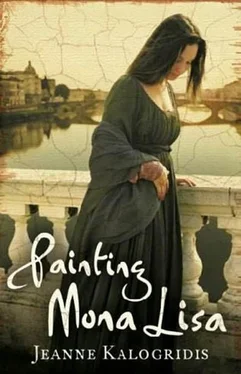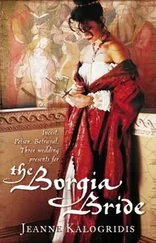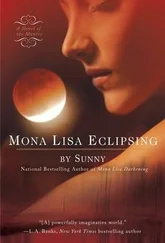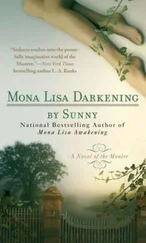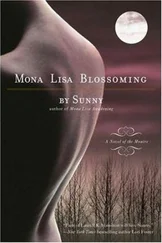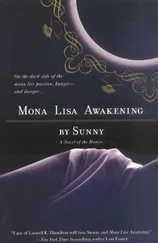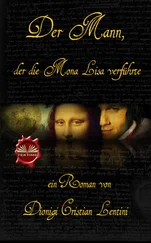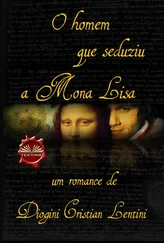We made our way into the city quarter of Santa Maria Novella, onto the Via Por Santa Maria, then east onto the Via Vacchereccia, home to the silk botteghe, including Francesco’s. The stalls stood in the shadow of the Arte della Seta’s, the Silk Guild’s, tower.
My husband’s palazzo lay on a side street behind black iron gates; it had been built expressly for him and his first bride. It was classically Roman, hewn from gray stone so pale it shone white in bright sun. Rectangular, strong, and starkly elegant, it rose four stories into the air, its face turned north, its back to my family home. This was the first time I had set eyes upon it.
As we approached the gates, I heard a shout. Francesco stood out in front, his palm thrust forward, fingers spread out, indicating that we should stop. Beside him, draped in dark mantelli, stood his stooped father and three middle-aged dark-haired men: his brothers.
I peered out the window at the road. A braided garland of satin ribbons, gleaming white and dark blue, lay upon the flagstones, stretching all the way from one edge of the street to the other.
There were no flowers to be had in March.
As his brothers cheered and catcalled, Francesco-smiling abashedly-went out and pulled a single strand. The garland was suddenly undone in the center, and as the men clapped, he hurried to pull the two halves far enough on either side to permit our carriage to pass through.
He was quite talented at it; after all, he had practiced it enough. I was his third spouse. The first had died in childbirth, the second of fever. I could certainly understand their eagerness to quit life.
The iron gate swung open. Francesco and his brothers emerged on horseback, followed by two wagons holding his family. Like those of my two predecessors, my nuptial carriage headed east, toward the looming vast brick-orange cupola of Santa Maria del Fiore. Once again, I leaned out the open window, grateful for the air, which had steadily cooled as the minutes passed. The sky was filling with heavy damp clouds.
My father repeated the old saying, “A wet bride is a happy bride.” A rainy wedding day supposedly brought luck.
At last we rolled into the great Piazza del Duomo and stopped. We waited a time while Francesco and his family preceded us into the Baptistery of San Giovanni, built upon an ancient temple dedicated to Mars. Here, all good Florentines were baptized as infants, wed as adults.
As my intended and the guests took their places inside, I waited an interminable time, fighting nerves and nausea; just when I was certain I would be ill, the signal was given, and I was forced to compose myself. Zalumma held my train as I stepped out. My father, haunted and loving, took my arm.
I walked with him past Ghiberti’s amazing doors. I had lived all my life in the city, yet had only once set foot inside that octagon of stone. I walked across marble floors adorned with images of gryphons and spirals, beheld golden walls, and stared up at the gilded cupola, the blazing candelabra.
The priest and Francesco-dignified, reverent, tender-stood waiting in front of the white marble altar.
The walk was a blur of sensations: the pull of the long velvet train behind me, the sparkle and flash of diamonds, the intense blue of my sleeve, the shimmering white of puffed gossamer silk. The glittering mosaics of Christ in blues and reds and brilliant saffron at the Last Judgment, of sinners cringing in Hell, tormented by devils.
My father held on to me tightly-so tightly-until the time came for him to give me away. As he handed me to Francesco, then stepped back, he wept.
An interminable Mass followed. I fumbled over prayers I had known since childhood, listened to the priest’s sermon without comprehending a word. The longer I stood, the more I feared I would faint; each time I knelt, I felt certain I would never again be able to stand.
“Will you?” the priest asked at last.
Francesco smelled of rosemary. I looked at him, at his deceptively gentle expression, and saw my bleak unhappy future. I saw my child being born, my father growing old. I saw Giuliano’s memory paling to a whisper.
“I will,” I said. My voice surprised me with its strength, its steadiness. I will, until my father dies. Until my father dies, and my child and I can escape.
A ring appeared-another plain and slender ring of gold-and caught the candles’ glow. This one was too tight, but Francesco used force to make it fit. I did not allow myself to flinch.
Francesco’s kiss was reserved, timid. There were other kisses, then, many kisses from many faces and many murmured words.
With my husband beside me, I stepped outside into the great piazza and drew in a breath. The afternoon was gray; mist hung in the air. Soft as steam rising from water, it settled on my face, but its touch was cold.
A fterward, our party returned to my new home. This time my carriage rumbled through the open black iron gates onto a circular drive of new flagstone that took us past a copse of young laurels. The entry doors, of intricately carved wood, were taller than any I had ever seen. To their east lay a large formal loggia for receiving guests in better weather.
The carriage stopped, and Francesco helped me out while Zalumma worried with the great trail of fabric that followed me. Crouched upon high pedestals, a pair of majestic stone lions guarded the threshold. We walked between them and the doors opened for us as if by magic.
A servant led us to the room on our left: a vast hall, the walls pristine white, the floor gleaming pale marble with black inlay of classical design. Beyond, past an archway, was a dining chamber, the surface of its long table entirely obscured by platters heaped with food. The size of the rooms was better suited for a prince and his court than our small gathering. Indeed, the fire in the dining chamber could not quite dispel the chill. This was a cold, formal place.
My new husband was a very rich man.
I had lived my life in a house more than a century old, with an interior of bland walls and plain furniture. I was used to uneven stone floors, worn by the tread of generations, to stairs that dipped in the middle, to doors whose edges were darkened by the touch of countless hands.
This house had seen barely a decade of wear, with floors that were perfectly flat and smooth and shining, with unscarred doors that sported bolts and hinges of bright metal. I did not like it at all.
None of my father’s relatives had chosen to come from the country, but Francesco’s brothers had brought their wives and children with them. Once his family had followed us inside, along with Uncle Lauro’s brood, the building seemed less empty, though the chatter echoed off the walls. When the wine was poured, a great deal of laughter followed, some of it loud and raucous.
Custom dictated that I ride a white horse to my wedding, then return from it on foot to my father’s house, where I would spend the night, alone and chaste. The wedding was not to be consummated until the second night, following a day of feasting.
But I flouted custom for my first wedding and my second. I did not ride the white horse. Nor did I walk back to my father’s house, a decision that had been reached due to three factors: I had suffered from fever the week before and was still weak, the weather was inclement, and I was pregnant. This last was not discussed openly, but my waist had so thickened that it was obvious to most. It caused only a passing concern, for formal betrothals were considered as binding as marriage. Many a Florentine bride had to let out her wedding gown before riding to San Giovanni, and no one thought worse of her for it.
I greeted more guests, Lord Priors and Buonomini, Francesco’s peers. A wedding meal soon followed, one that Savonarola would have frowned on for its excesses: whole roast mutton, two whole roast pigs, three geese and a swan, countless pheasants, several rabbits and dozens of fish, soup and cakes and pretty candies, six different types of pasta in broth, cheeses, nuts, and dried fruits.
Читать дальше
Конец ознакомительного отрывка
Купить книгу
